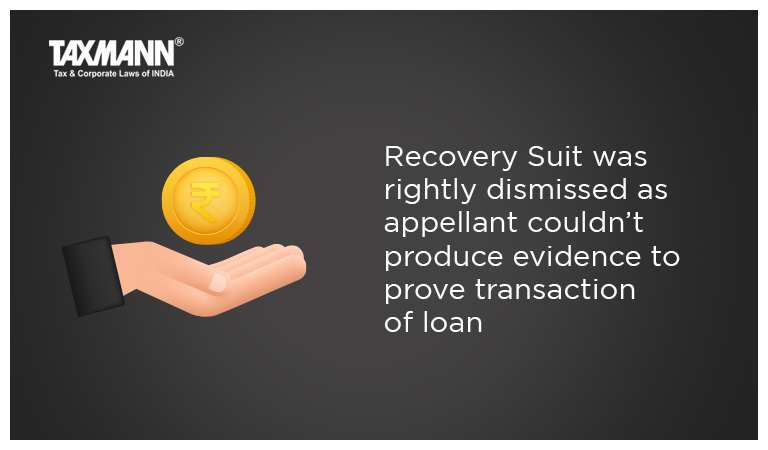Recovery Suit was rightly dismissed as appellant couldn’t produce evidence to prove transaction of loan
- News|Blog|FEMA & Banking|
- 2 Min Read
- By Taxmann
- |
- Last Updated on 15 July, 2022

Case Details: [2022] 140 taxmann.com 27 (Karnataka) Pawan Ahuja v. Saravana Alloy Steels (P.) Ltd.
Judiciary and Counsel Details
-
- Dr H.B. Prabhakara Sastry, J.
- Ramesh Chandra & Smt. K. Geetha, Adv. for the Appellant.
- Tarun A.N. for the Respondent.
Facts of the Case
In the instant case, the defendant, a director of Private Limited Company approached the plaintiff and borrowed a sum of Rs. 20 lakhs for their business purpose agreeing to repay the loan amount together with interest thereupon at the rate of Rs. 1.90 percent per month.
It was the case of the plaintiff that towards the repayment of the said loan amount, the defendants had repaid a sum of Rs. 2 lakh each on 5 dates, in all a total sum of Rs. 10 lakhs. The defendants had also paid a sum of Rs. 1.98 lakh towards interest in favor of the plaintiff. However, the defendants failed to pay the balance principal amount of Rs. 10 lakhs and interest thereupon.
Appellant further submitted that respondents had issued three cheques, towards repayment, however, those cheques were dishonored when presented for realization.
The Appellant made several requests for repayment of the loan amount, but since respondents did not repay the loan amount, the appellant instituted a suit claiming a total sum of Rs. 14.12 lakhs.
The Trial Court dismissed the suit of the appellant. It was found that though the appellant had sufficient materials, more particularly, documentary proof like his bank passbook, statement of account, register, etc., to show the transaction of the loan with the defendants, admittedly, he had not produced any one of them. Therefore, an adverse inference could be drawn to affect that contention of the appellant that he had given a loan to the respondent through a cheque, did not appear to be true.
Appellant claimed that respondents had issued three cheques, towards loan repayment, however, there was no evidence to show that cheques were presented for realization and same had been dishonored by the drawee bank, it could not be held that appellant as a payee in cheque had charged drawer, as per section 72 and consequently, since he had not presented the cheque, it could not be held that respondents had acknowledged debt as such extending limitation under section 18 of Limitation Act
High Court Held
On appeal, the High Court held that three cheques did not go to show that limitation had been extended, then, even according to the appellant, alleged loan being of date 19-4-2013 and admittedly date of filing original suit in trial Court being 22-3-2017, which was beyond three years from the date of arisal of cause of action, thus, the suit was hopelessly barred by limitation.
List of Cases Referred to
-
- Smt. Savithramma R.C v. Vijaya Bank AIR 2015 Kar. 175 (para 13)
- Hindustan Apparel Industries v. Fair Deal Corpn. AIR 2000 Guj. 261 (para 18).
Disclaimer: The content/information published on the website is only for general information of the user and shall not be construed as legal advice. While the Taxmann has exercised reasonable efforts to ensure the veracity of information/content published, Taxmann shall be under no liability in any manner whatsoever for incorrect information, if any.

Taxmann Publications has a dedicated in-house Research & Editorial Team. This team consists of a team of Chartered Accountants, Company Secretaries, and Lawyers. This team works under the guidance and supervision of editor-in-chief Mr Rakesh Bhargava.
The Research and Editorial Team is responsible for developing reliable and accurate content for the readers. The team follows the six-sigma approach to achieve the benchmark of zero error in its publications and research platforms. The team ensures that the following publication guidelines are thoroughly followed while developing the content:
- The statutory material is obtained only from the authorized and reliable sources
- All the latest developments in the judicial and legislative fields are covered
- Prepare the analytical write-ups on current, controversial, and important issues to help the readers to understand the concept and its implications
- Every content published by Taxmann is complete, accurate and lucid
- All evidence-based statements are supported with proper reference to Section, Circular No., Notification No. or citations
- The golden rules of grammar, style and consistency are thoroughly followed
- Font and size that’s easy to read and remain consistent across all imprint and digital publications are applied



 CA | CS | CMA
CA | CS | CMA
